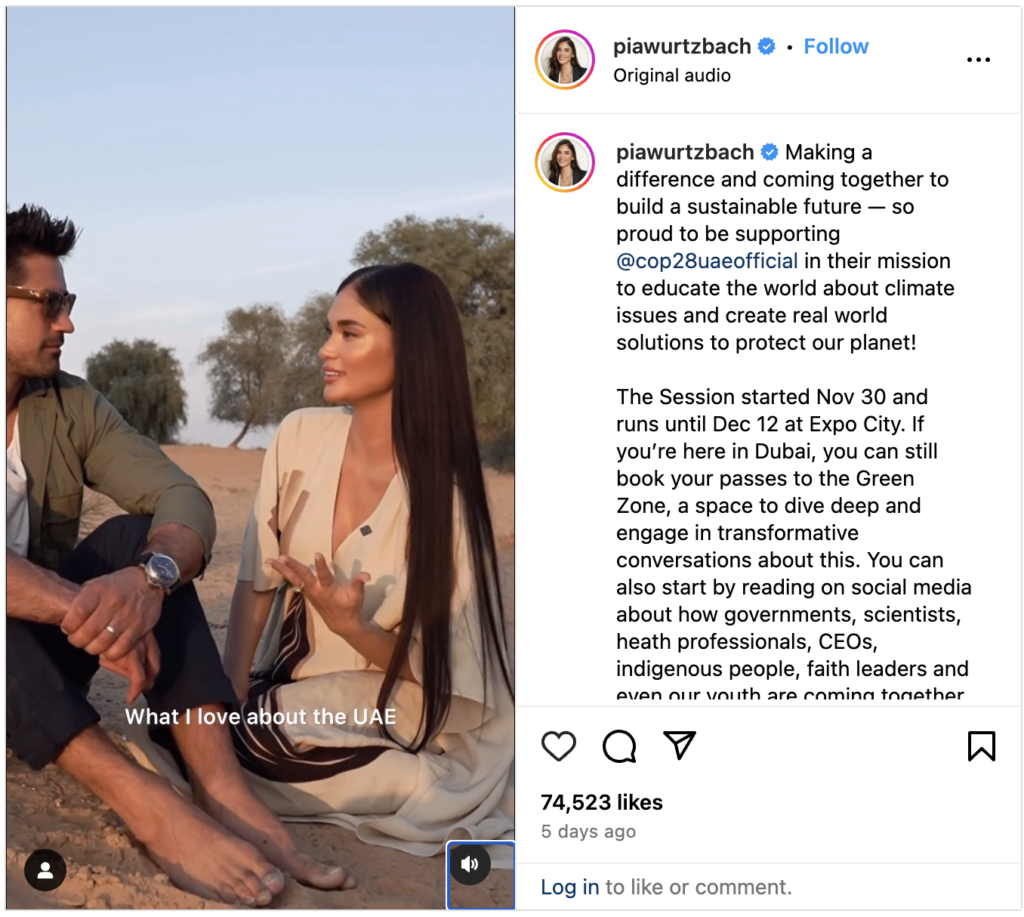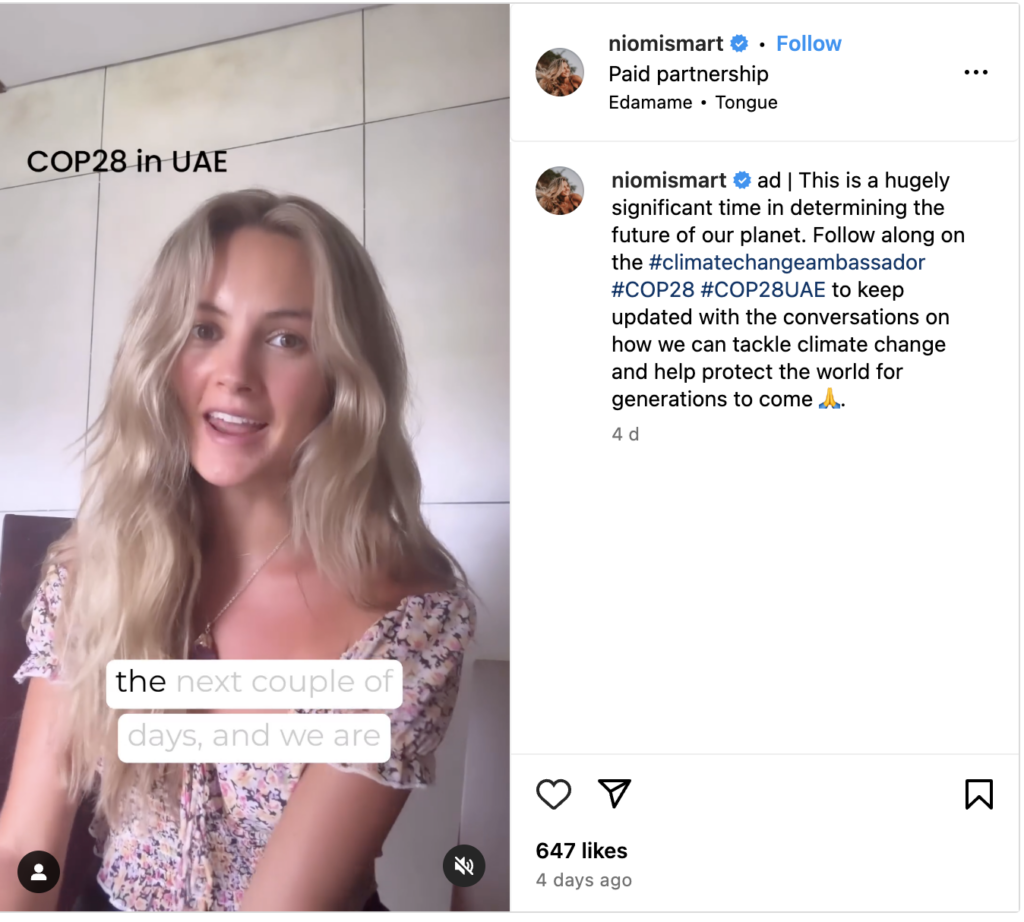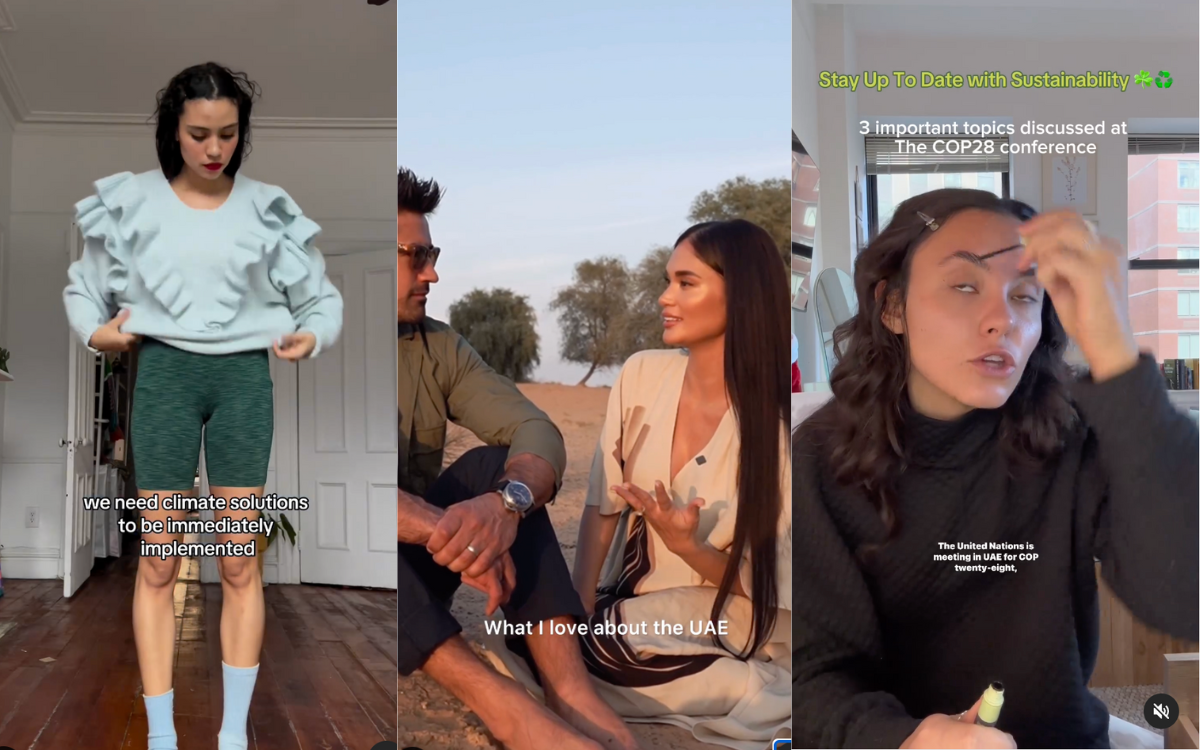Social media influencers were paid to boost the UAE’s climate credentials in and around COP28 in what appears to be a coordinated PR effort by the oil-dependent host nation, DeSmog can reveal.
Instagram videos of glamorous couples lounging on sun-filled beaches or giving quirky outfit tutorials were used to spread positive messaging about the COP process and the UAE’s position on climate, as the critical UN talks progressed in Dubai.
Two of the contracted influencers confirmed to DeSmog they were paid by an external PR company hired by the COP28 official team.
The summit closed on 13 December with an historic agreement to limit fossil fuel use, which the Emirates has coined the ‘UAE consensus’. But the text was criticised by small island states, campaigners and scientists for failing to call for a rapid phase out of oil, gas and coal and being “full of loopholes”.
Reports of the fossil fuel interests of the host country dominated much of the media coverage of the summit.
COP28 president Sultan Ahmed Al Jaber, also chief executive of the Abu Dhabi National Oil Company (ADNOC), was revealed to have planned to make oil and gas deals on the sidelines of COP. In the run-up to the UN talks, DeSmog revealed that the PR company Edelman, which has worked extensively with the fossil fuel industry, had helped to secure Al Jaber’s ascension to COP president.
New research by the Climate Action Against Disinformation (CAAD) group, shared with DeSmog, suggests the host nation was behind a significant social media push to improve their online image to a younger generation.
Researchers identified at least five high-profile Instagram accounts which appeared to promote the UAE as a climate leader during the summit.
The content appears to be official promotional material endorsed by the COP28 hosts, featuring the hashtags #climatechangeambassador, #COP28, #COP28UAE and tagged the official UAE COP28 Instagram account @cocp28uaeofficial.
It comes after DeSmog revealed earlier this year the ways in which fossil fuel giants are using influencers to greenwash their reputation. The research featured an example of how oil company Shell used a ‘Granfluencer’ – TikTok star Nora Capistrano Sangalang – to promote a fuel rewards programme for the company.
Francesca Willow of Clean Creatives, a campaign group focusing on the influence of fossil fuel money in marketing, said the use of social media influencers was “part of a very elaborate PR approach that the fossil fuel industry has taken for a very long time”, at which the UAE was “particularly adept”.
“They know what they need to project to stay relevant in the 21st century,” she told DeSmog. “There should be a question about whether a regime should be allowed to work with influencers at all. There’s a huge leap between influencers being sent a free dress from a fast fashion company, and being paid to say ‘this nation-state is good’.”
“It’s disappointing to see that influencers are being misled in this way because COP is a really complicated process,” said Harriet Kingaby, founder of the Conscious Advertising Network.
“This kind of greenwashing is part of a much wider strategy by the fossil fuel industry to keep people confused and therefore slow climate action, and it’s frankly unacceptable when we face this crisis on the timeline we do. The fact that they contravened platform policies and legislation by not declaring it as an ad, only add to the level of deception.”

‘Reducing Emissions’
The research by CAAD, which tracked climate disinformation during the summit, uncovered videos by influencers which claimed that the Emirates is committed to “reducing their emissions”. These were viewed over 2.4 million times from the start of the summit on November 30. The UAE is planning to scale up its fossil fuel operations in the next four years to the tune of $150 billion.
The most widely viewed posts were from an influencer couple based in Dubai, Jeremy Jauncey and Pia Wurtzbach, who have a combined following of over 16 million.
They both posted different edits of the same video to Instagram on December 5 and 9, apparently filmed on a beach in Dubai, which claimed that the UAE “has a strong commitment to conservation and sustainability” focused “on a circular economy, recycling and reducing emissions” and is “dedicated in protecting its land and marine ecosystems”.
Jauncey is a well-known figure in Dubai, who runs a travel business called “Beautiful Destinations”, boasting an Instagram following of over 26 million.
Influencers in the UAE are required to apply for an ‘Influencer Licence’, at a cost of around £3,000, from the government that comes with a set of conditions. These include a clause that licence holders “must avoid sharing a message that mocks the leaders or disturbs the peace in any way”.
Jauncey and Wurtzback did not declare any paid partnership with COP28 anywhere on their posts.
In the UK and elsewhere, declaring paid partnerships is a legal requirement. On Instagram, this means posts would need to include explicit mention of the paid relationship, either using phrases like “sponsored content”, “ad” or a “paid promotion” badge.
They did not respond to DeSmog request for comment.
At least three other influencers, Niomi Smart, Jazmine Rogers and Nik Pollina, who have a combined following of 1.45 million, posted pro-COP content and made similar claims about the summit. Only one influencer declared a paid partnership.
They followed a similar script, outlining the importance of COP28 and that this COP is about assessing progress towards the Paris goals, stressing four pillars: “clean energy sources, climate financing, people and nature and inclusivity.”
The posts shared the same hashtags and tagged the same official COP28 Instagram account. One influencer told DeSmog they had “followed the guidelines and suggested hashtags provided by COP28”.
Only one of the three reels mentioned limiting fossil fuel use, emphasising that it must be done “in a responsible way.” Each influencer published one pro-COP28 video.

‘Deeply Disappointed’
The influencers who spoke to DeSmog said they had created the posts in good faith and were disappointed that the UAE had used COP28 to lobby for its own oil interests.
Jazmine Rogers and Nik Pollina both confirmed that they had run a paid partnership with COP28 – yet neither of these influencers declared a paid partnership on their posts. Both suggested that they had followed the guidelines set out by the PR agency, which they described as not “out of the ordinary”.
Neither would disclose the name of the agency that hired them.
“The content was created and published previous to my knowledge of the UAE potentially influencing COP and I am deeply disappointed with how it turned out,” Rogers told DeSmog. “But I was never informed of this campaign having specific ties with the UAE.”
Rogers said: “I took this specific campaign to bring up the conference to a wider audience of people who have never heard of it before, as most of my friends and family I had talked to said they had never heard of it.
“I tried to make my post simply to inform others and to encourage them to have their eyes on it (and not to just ignore it) and hold them accountable to the four pillars they stated they would address.”
Nik Pollina said: “It has been unfortunate to see that the UAE has extremely conflicting actions in relation to decreasing 1.5 degrees celsius goals.”
The Emirates exert tight control over influencer content. In July, an influencer was arrested over a satirical TikTok video in which he depicts an Emirati on a spending spree inside a luxury car showroom.
The man was accused of “abusing the internet” for posting “propaganda that stirs up the public opinion and harms the public interest,” according to The Federal Prosecution for Combating Rumors and Cybercrimes.
“I want to believe that some of these influencers have been misled, because fossil fuel PR are clearly very good at what they’re doing,” said Francesca Willow, a climate activist who has works with Clean Creatives, a campaign group focusing on the influence of fossil fuel money in marketing.
“There might be some more naive influencers who genuinely believe what they’re told, because they might not have had training on climate.”
But ultimately, she said, “any influencer who’s taken the money and is fully aware of what the UAE is doing has made their bed, and is going to have to lie in it”.
The COP28 presidency did not respond to DeSmog’s request for further information or comment.
Subscribe to our newsletter
Stay up to date with DeSmog news and alerts







